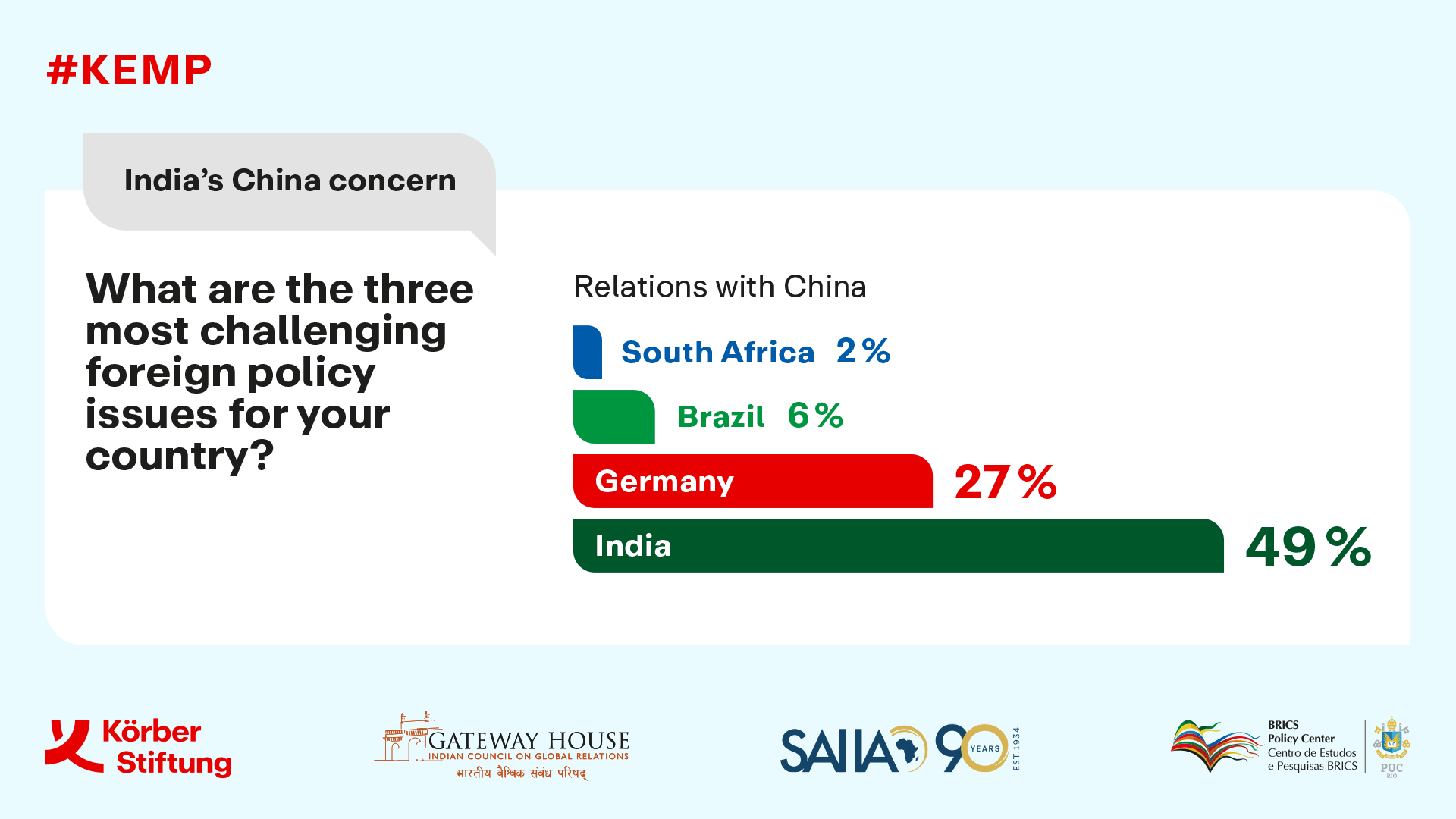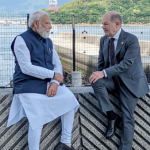The emergence of India, Brazil and South Africa as powers on the world stage has implications for the older middle powers in Europe, including Germany. The findings of the Emerging Middle Powers Report 2024 provide crucial insights for German policy-makers in this regard.
For 49 per cent of respondents in India, China is the most significant foreign policy concern. This is a view not shared in Germany (27 per cent), Brazil (6 per cent) and South Africa (2 per cent). The main reason is India’s decades-long border dispute with China, which was exacerbated by the Chinese violation of the border in 2020, resulting in strained relations.

Indian respondents also worry about China’s growing influence in South Asia, including through the Belt and Road Initiative, which is considered a threat to India’s sovereignty and territorial integrity. The mistrust of China extends to the Shanghai-based BRICS Bank, seen as the least useful financial institution for Indian interests. This perception also explains India’s preference for the G20 over the BRICS, where Chinese influence is on the rise.
The survey underscores how important the United States is for India. It is seen as a natural partner in the country’s quest for growth. And both countries have many commonalities including democracy, the English language and deep people-to-people ties, manifest in the four million-strong and politically emergent Indian diaspora in the United States. Moreover, for New Delhi, the United States is a critical partner in countering China, while for Washington India is a major bulwark against China’s aspiration to dominate the Indo-Pacific and central to its strategic thinking.
The mutual interests of the two countries bring strong positivity, evident in their participation in the Quad and the Indo-Pacific Economic Framework. The launch of the United States-India Initiative on Critical and Emerging Technology to expand their strategic technology partnership and defence industrial cooperation is helping to address a nagging trust deficit between both countries.
Many Indian experts and policy-makers see technology transfer and economic cooperation as key to taking bilateral ties to even greater heights. A top priority for both sides is to bridge remaining confidence gaps. For instance, the United States still has strong ties with Pakistan, and recently it was on a different page from India on the elections in Bangladesh.
France and Germany are important partners for India, playing a crucial role in strengthening the country’s traditional ties with the European Union. Germany is India’s largest trade and economic partner, but the strong strategic binding with France sets it in a class apart. It is no surprise that Indian respondents consider France a more important partner than Germany. Its status as a permanent member of the United Nations Security Council with veto power is particularly important for India, especially on the issue of Kashmir.
France’s strength in military aviation and its willingness to be a differentiated member of the West are important to Indians because they allow India to maintain strategic autonomy in its relations with the West. For India – given the tensions on its borders with China and Pakistan and the contested Indo-Pacific – military, nuclear energy, and space cooperation are key elements for a strategic relationship. Germany must step up its bilateral cooperation in these areas, while respecting India’s strategic autonomy, in order to enhance their partnership.
Given its economic power within the EU, I also hope that Germany will play a much more proactive and pro-India role in the negotiations for an EU-India trade agreement. This would be welcomed by experts in India, who see much to be gained from the conclusion of this agreement.
While the EU remains a major economic partner, its constant harping on India’s domestic issues means that it is perceived as an important partner but not an all-weather one. If the EU and Germany would be more understanding of India’s democracy and appreciative of its role in upholding a rules-based order, including in the Indo-Pacific, their relations would be greatly improved.
India cooperates significantly with Brazil and South Africa at the trilateral, plurilateral and multilateral levels. This is reflected by the fact that most Indian respondents see the G20 and the BRICS+ as groupings that promote global governance and a reform of the UN Security Council.
But, despite several areas of convergence, India’s relations with Brazil and South Africa have not reached their full potential. This is reflected in the survey results, which do not show either country among the five most important bilateral relationships for Indian respondents. This needs to change, and I am optimistic that it will when the IBSA countries work together as the G20 Troika. They also have a special bond with Germany in their efforts to reform the UN Security Council.
Although the four countries are bound by democracy, their geopolitical positions towards each other still stem from historical and economic linkages and are very different. Legacies of colonial rule and civilizational differences – including in ethnicity, language, and religion – also play a role in these asymmetries. Intensified people-to-people contacts along with increased efforts to overcome the anglophone understanding of these countries, particularly India and South Africa, should be useful for Germany.
India is now the world’s most populous country. It has the fifth-largest economy and will become the third largest, overtaking Germany, in the next decade. This places it at the pinnacle of the world and in a unique position compared even to Brazil, Germany and South Africa. The realization of this and the resulting confident foreign policy have been evident in India since the start of the century, and they are now firmly rooted following its successful G20 presidency last year.
Manjeev Singh Puri is a Former Ambassador and Lead Negotiator for India at Climate Change negotiations.
This article earlier appeared in the Listening Beyond the Echo Chamber: Emerging Middle Powers Report.
For republication and other inquiries, please contact outreach@gatewayhouse.in.
Support our work here.


